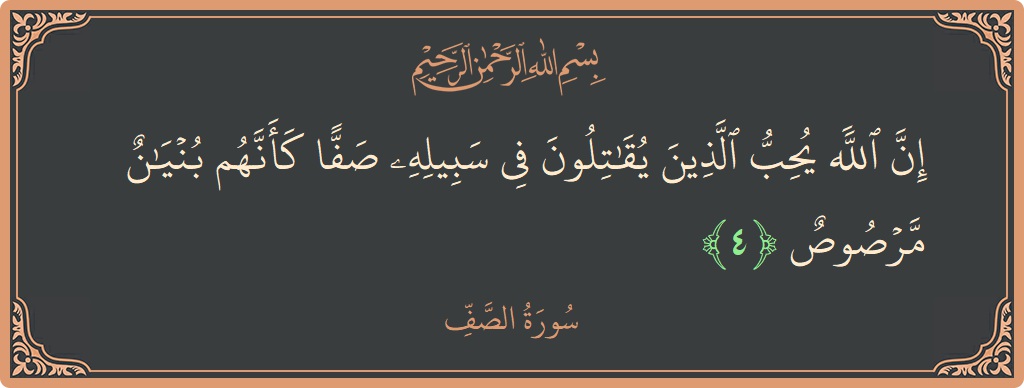Surah As-Saff: Verse 4 - إن الله يحب الذين يقاتلون... - English
Tafsir of Verse 4, Surah As-Saff
English Translation
Indeed, Allah loves those who fight in His cause in a row as though they are a [single] structure joined firmly.English Transliteration
Inna Allaha yuhibbu allatheena yuqatiloona fee sabeelihi saffan kaannahum bunyanun marsoosunTafsir of Verse 4
إِنَّ اللَّـهَ يُحِبُّ الَّذِينَ يُقَاتِلُونَ فِي سَبِيلِهِ صَفًّا كَأَنَّهُم بُنْيَانٌ مَّرْصُوصٌ (Surely Allah loves those who fight in His way in firm rows, as if they were a solid edifice...61:4) The main subject of this Surah for which it was revealed is to mention the dearest action in the sight of Allah. This verse states that it is jihad in Allah's way, and that the best row of battle in the sight of Allah is the one firmly established against Allah's enemies to make Allah's word prevail, and which, on account of the valor and unshaken determination of Mujahidin, looks like a strong structure cemented with molten lead.
This is followed by a description of the Jihads which Prophets Musa and ` Isa (علیہما السلام) fought in Allah's Cause, and how they suffered at the hands of the enemies. After this description, the Muslims are directed to undertake jihad. The stories of Prophets Musa and ` Isa (علیہما السلام) have many academic and practical lessons and guidance to offer. For instance, it is described in the story of ` Isa (علیہ السلام) that when he invited the Children of Israel to accept his prophethood and obey him, he mentioned two things in particular. First, he said that he was not a unique Prophet who came with unique teachings. In fact, his teachings were the same as those of the previous prophets. They are mentioned in the earlier celestial scriptures, and the same teachings will be imparted later by the Final Messenger of Allah ﷺ . From among the earlier Scriptures, Torah is specially mentioned in this context, probably because that was the latest Scripture that was revealed to the Children of Israel. Otherwise belief in the Prophets embraces all the previous Scriptures of Allah. This also points out that the Shari’ ah of ` Isa (علیہ السلام) was, though an independent Shari’ ah, its most rules conformed to the sacred laws of Musa (علیہ السلام) and the Torah. Only a few laws had been changed. This theme covered the subject of belief in the previous Prophets and their Books.
The second thing ` Isa (علیہ السلام) mentioned in particular was the good news of the advent of the Final Messenger ﷺ . This too points out that his teachings will also be the same as those of the previous Prophets (علیہم السلام) ، and therefore it is the demand of reason and honesty to believe in him.
Prophet ` Isa (علیہ السلام) foretold the Children of Israel that a Final Messenger ﷺ will come after him by the name of Ahmad. When he appears, it would be obligatory for them to embrace faith in him and obey him مُبَشِّرًا بِرَسُولٍ يَأْتِي مِن بَعْدِي اسْمُهُ أَحْمَدُ (…and giving you the good news of a messenger who will come after me, whose name is Ahmad."...6) The name of the Final Messenger ﷺ is given here as Ahmad. The name of the Final Messenger ﷺ was Muhammad and Ahmad. He had some other names as well. However, the name given in Injil is Ahmad rather than Muhammad, perhaps because Muhammad was a common name in Arabia since time immemorial. There was a possibility that the people might take the reference to some other person, rather than the Final Messenger of Allah ﷺ . The name Ahmad, on the other hand, was an uncommon name in Arabia, and was exclusive to the Final Messenger of Allah ﷺ .
Prophecy of The Final Messenger of Allah ﷺ in Injil
It is a known fact that the previously revealed Divine scriptures have been changed and distorted. The Jews and the Christians themselves had to admit that Torah and Injil have been subjected to changes and distortion. As a matter of fact, the distortions made in these scriptures are so drastic that it is hardly possible to make out the original texts of the scriptures. Based on the distorted version of Injil, the Christians today challenge the correctness of the Qur'anic version of the prophecy, asserting that no prophecy in the name of Ahmad is found in the Injil. An elaborate response to Christian challenge has been prepared by Maulana Rahmatullah Kairanwi (رح) . The name of his book is Izhar-ul -Haqq. He has thoroughly analyzed Christianity and changes made in the Bible. He concludes that despite drastic changes in the present Biblical version the prophecy about the Prophet Ahmad ﷺ is still available.
This book was originally written in Arabic, later its translations appeared in Turkish and English. Christian missionaries attempted their utmost to destroy it. Its Urdu translation was not available until recently. A little while back, Maulana Akbar ` Ali, a lecturer at Darul Uloom Karachi, translated it into Urdu, with in-depth research into current versions of the Bible by Maulana Muhammad Taqi, lecturer at Darul Uloom, and published in three volumes. Volume [ 3] from pages 182 to 362 elaborates on the prophecies pertaining to the Holy Prophet ﷺ with reference to the currently published Bibles, and rebuts their doubts and allays their suspicions.
